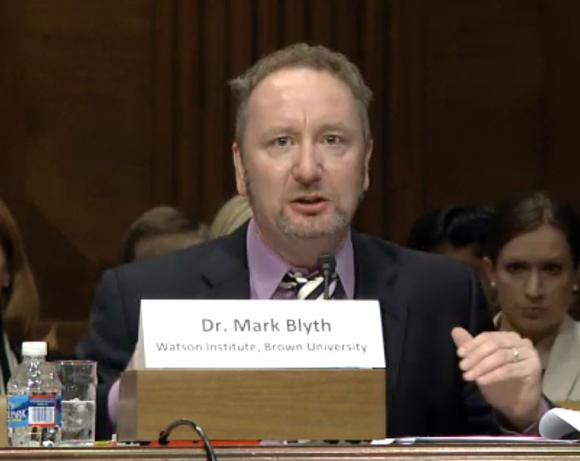PROVIDENCE, R.I. [Brown University] — Testifying at a hearing of the U.S. Senate’s Committee on the Budget titled “The Better Way: Benefits of a Balanced Budget,” Mark Blyth, professor of international political economy at Brown University’s Watson Institute for International Studies, referenced many of the ideas in his 2013 book Austerity: The History of a Dangerous Idea (Oxford University Press), which looks at the negative effects cost-cutting measures have had on economies over time, including most recently in several European countries like Greece and Spain.
“[Budgetary austerity] is really not working out so well in Europe and it would be a disaster if it were tried here too,” Blyth wrote in his prepared testimony.
While balancing the budget through spending cuts may seem like an “intuitive” step to take, Blyth outlined several reasons why cuts won’t make the economy better.
“The result in Europe has been plain to see — a massive contraction in economic activity, with those that cut the most seeing the steepest collapse in growth and, paradoxically, the biggest build-up in debts,” Blyth wrote. “This is hardly a surprise historically since pretty much all attempts to balance budgets have resulted in recessions or depressions.”
Blyth also stressed the “critical role” that U.S. debt plays in the economy — including the $1.24 trillion of the nation’s debt that China holds — and tried to dispel some of the confusion he said exists around the idea of national debt.
“Debt is investment, even public debt. It is not a deadweight loss, and without it we would never have the industries that we have today,” he wrote.
Blyth ended his testimony by cautioning against taking action based on projections of the U.S. budget and its debt levels 20 years from now, pointing out that past events, like the end of the Cold War and 9-11 have had major effects on the budget that no one could have predicted.
“Projecting out these smooth linear trend lines is negative information. We don’t know what the future holds but we do know that whatever it will hold it will not be that projection. So to base policy on that projection is to politically create the future today before it comes to pass.”
Today’s hearing, convened by Sen. Mike Enzi (R-Wy.), also included testimony by John Engler, president of the Business Roundtable and former three-term governor of Michigan, and Maya MacGuineas, president of the Committee for a Responsible Federal Budget.
Video of the testimony can be viewed online.

